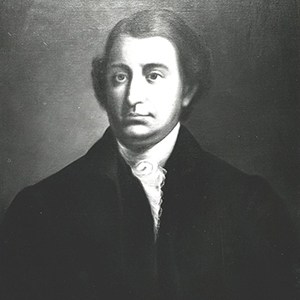Edmund Randolph represented Virginia at the Constitutional Convention. He then went on to serve as the country’s second Secretary of State and the first United States Attorney General.
Early Life
Randolph was born into a wealthy Virginia family. After attending William and Mary College, he entered the practice of law. While his father was a loyalist and ultimately returned to Britain when the war broke out, Randolph joined the patriots in fighting for independence. He enlisted in the Continental Army and served as aide-de-camp to General George Washington.
Political Career
Randolph represented Virginia in the Continental Congress from 1779 to 1786. He was elected Governor of Virginia in 1786, and transferred his law practice to his partner (and future Supreme Court Chief Justice), John Marshall.
Randolph represented the State of Virginia at the Annapolis Convention and again at the Constitutional Convention. In his character sketch of Randolph, William Pierce described the Virginia Governor as:
[A] young Gentleman whom unites all the accomplishments of the Scholar and the States-man. He came forward with the postulate, or first principles, on which the Convention acted, and he supported them with a force of eloquence and reasoning that did him great honor.
The Virginia Plan & Later Career
Randolph introduced and was a vocal supporter of the Virginia Plan. The plan, which was proposed at the start of the Convention, favored a strong national government that was divided into three branches. Although significantly revised through the course of the Convention, the Virginia Plan formed the basis for the Constitution.
Randolph stayed until the end of the Constitutional Convention, but declined to sign the final document. In his opinion, the “Republican propositions” of the Virginia Plan had “much to his regret been widely, and in his opinion, irreconcilably departed from.” He favored convening a Second General Convention.
James Madison eventually convinced Randolph to support the Constitution, and he played a crucial role in the Richmond ratifying convention. While he still believed the Constitution established an imperfect form of government, he acknowledged that it was in Virginia’s best interest to join the union. “The accession of eight states reduced our deliberations to the single question of Union or no Union,” he stated.
Randolph later served in President Washington’s cabinet as as the Attorney General of the United States (1789-1794) and U.S. Secretary of State (1794-1795).








